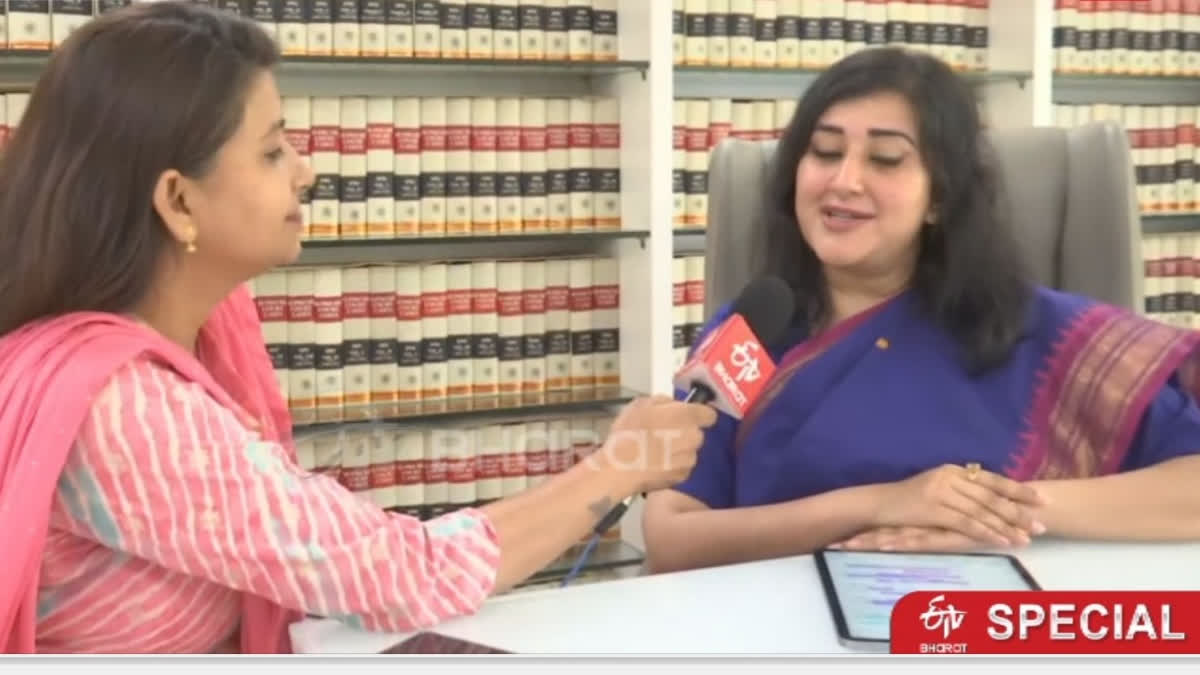New Delhi: Even after 76 years of independence, what is the status of women in the country? Still, many women are being raped and harassed even minors are not being spared. In 76 years, many laws have been introduced to improve and protect the status of women. Despite all this where does the real status of women stand? ETV Bharat had a special conversation with advocate Bansuri Swaraj, who has been practising in the Supreme Court for the past 16 years.
All the laws framed at the time of independence have been amended as per the need. Even before independence, there were provisions of criminal law. IPC was introduced before independence. There were many laws for the safety of women in it. However, in 2018 several amendments were made. In this, the punishment awarded to the accused of rape was increased from 7 years to 10 years.
Bansuri said that after the Nirbhaya incident, many amendments were made to the rape case law. Similarly, when the cases of domestic violence increased in society, then the Protection of Women Act, of 2005, was brought. Apart from this, when it was seen that the economic and social development of women is being hindered due to child marriage, then changes were made to the Child Marriage Act. In this, earlier the age of marriage of girls was 14 years. After the amendment to the Act, the minimum age for girls to get married was 18 years and the minimum age for boys was 21 years.
Also read: 10 years of Nirbhaya case: 'Nothing has changed for women in Delhi except...'
Bansuri told that the Child Marriage Act has just been amended, in which the minimum age of marriage for both boys and girls has been made 21 years. The main reason behind this is that due to marriage at a young age, girls are not able to complete their studies. After this amendment, girls will be able to complete their studies. They will not have to face many difficulties in getting a job later.
The safety of women in the workplace is ensured by POSH Act India. Working women have an important role here. Bansuri said that even when women started working outside the home, they had to face many kinds of exploitation at the workplace. Hence, the Sexual Harassment of Women at Workplace Act 2013 was brought. With the help of this law, women have ensured safety at their workplaces. Especially in cases of sexual harassment. The Sexual Harassment of Women at Workplace Act was brought in and this is also called POSH Act.
Information Technology Act 2000 was brought to make women more secure in society to initiate action against those who make indecent comments on social media. In this, there is a preparation to take the cases of online cyber police under the legal ambit. According to Basuri, "We all know that the social media platform has become an integral part of everyone's life. In such a situation, if a woman or a girl posts anything on Twitter and Facebook account, many times they have to face indecent comments. After the increase in such incidents, changes have also been made to the IT Act. In this, a provision has now been made to punish the accused for three years.
Also read: Women 'master of multitasking', says RSS chief
Nirbhaya law is better, but there is a problem with implementation. Nowadays, most of the cases related to domestic violence come to the courts. Being a woman and a lawyer, the Nirbhaya Law brought in for sexual harassment cases is one of the best laws in terms of women's safety. But, the problem is the implementation of the law. After introducing any law, it is necessary to implement it smoothly. Bansuri believes that, along with the law, there is a need to inculcate good manners in the children at home. In the family, the way the daughter was brought up, sons, too, need to be raised similarly so that they would become good citizens.
How will the victims of economically weaker sections get justice? In response to this, Bansuri said that there are advocates for people belonging to all walks of life in the court. Many NGOs help the victims of those who cannot afford advocates.
Speaking about domestic violence, she said the victims should fearlessly lodge a complaint. Many aggrieved women do not file complaints for fear of their names being exposed in public. Bansuri said that the identity of women victims of serious cases like sexual abuse and rape has been kept confidential in the court. In such a situation, the aggrieved woman should complain. The legal process and society are always with them, she pointed out.



